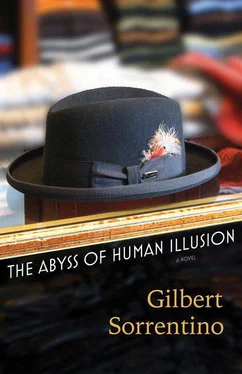The husband yanked and pulled his wife over to the sofa and sat her down, then looked at his old friends, and sneered at them. “Here’s your fuckin’ friend!” He opened the closet door and pulled out his overcoat and Zoltan’s, while Jake stood in the open doorway, in something more than shock — did he really know these people? The husband gave Zoltan his coat, put his on, and picked up one of the bottles of Scotch Jake had put on the floor what seemed like hours before. “I’m not interested in you people anymore,” he said. “I’ll call you soon, bitch,” he said to his wife. Then he pushed Zoltan out the door and followed him, leaving the door open: they began quarreling as they went down the stairs.
“Jesus,” his wife said. “Jesus.” She sat sprawled on the sofa, her legs apart; both men stared at her, embarrassed. The hostess gave her a glass of straight bourbon and roughly, angrily yanked her skirt down her thighs. “Keep your skirt down!” she said. “You child .”
The professor had made a small but firm reputation as a translator of late nineteenth-century French poets, the lesser lights, so to speak, most especially Laforgue and Corbiere, of the great Modernist explosions of the age. His translations were quietly celebrated as definitive “for our time.”
It may not be surprising to note that the professor, in his youth, had been an aspiring poet, but his talents were meager and so he moved resolutely, yet with a somewhat bohemian show of the devil-may-care, through his education, earning his PhD at the age of twenty-eight, and starting the nerve-wracking process of “getting settled,” i.e., being granted tenure. The professor did not quite think of himself as an academic, but as an artist, and perhaps, in his own vaguely deluded way, he was. He may have silently vowed the physician’s vow: first, do no harm.
He ultimately got tenure at a mediocre state university, where his colleagues in the comparative literature program were to grow jealous of his small fame (an article in the Chronicle of Higher Education had included his name and a few lines on his translations in an article on “poet professors” it was noted that his work was “dazzlingly eccentric,” yet “sound in its meticulous scholarship”).
His scholarly career had been “checkered,” for from an undergraduate interest in the “silver” or “drab” poets of the early English renaissance, he moved, unexpectedly, into an enthusiastic — or so it appeared — study of Aubrey Beardsley, Oscar Wilde, The Yellow Book, etc.; in short, the English Decadence. It was rather stale stuff, but the book he made of it — and which earned his tenure — caused a stir because of his carefully ingenious argument that a pornographic homosexual novel anonymously published, ca. 1895, Teleny, was written by Oscar Wilde. His comparison of the style with that of Dorian Gray was somewhat strained, but “unusual and “daring,” especially in the argument that conflated the protagonists of both novels as the same depraved dandy. But that was that — the English Decadence, the professor learned, led nowhere but to a lifetime in, let’s say, northern Iowa. That would never do.
And so he moved, with some flattery, here and there, some to-ing and fro-ing and faculty lunches and dinner parties, into the outer precincts of the romance languages department, and Vallejo became the center of his new book, a neohistorical study of the imagery in Trilce, that got him an offer from a very good private university, after which it was adiós to Vallejo, and the French poets were suddenly hauled from the wings, where they had, perhaps, been sitting for some time with Max Beerbohm and the Earl of Surrey.
In his new post, he modestly requested of the creative writing program if he might teach a course in literary translation, under its auspices of course, and his growing celebrity made this a cinch, especially since he offered to teach it in addition to his regular course load. So there he was, a writer, in effect, at last. He was very much “like” a writer, even, with his beret and faded denim shirts, his bicycle and worn corduroys. Well
He married a graduate student some two years later, a washed-out young woman of great sensitivity, who made a first — play splash with a little one-acter called ¡Ay Caramba! “Its intermittent sizzle comes from its winningly disingenuous juxtaposition of Hebrew linguistics, Twelve-Step dogma, the CIA, and the ties between them,” asserted the Village Voice, with guarded enthusiasm. They are both middle-aged now, and the professor’s wife has all but given up writing and has begun showing her photographs at a “discriminating” gallery in town. The professor now teaches but one course a semester, a freshman seminar in the English Decadence, in which he assigns his own book, self-deprecatingly, to be sure. He loves the fact that his bluntly sexual chapter on Teleny makes his students look at him with a surprised respect. And, not to forget, he is writing poetry again, and publishing it in the literary magazine of the English department, Redwood Review.
He’d finally got a job checking freight for the King Assembly Agency, working on a North River platform of the Pennsylvania Railroad, with whose checkers and car loaders the assembly agency worked in tandem.
The weather had grown increasingly colder as January progressed, and one morning, as he walked into the violent wind blowing up Fortieth Street from the river, he knew that this day, the first truly cold day on his new job, would be astonishingly cruel. And so it was.
His marriage had been steadily disintegrating, even though it was barely more than a year old. His wife looked at him, or so he thought, with a passive, almost friendly, benign contempt, although he had no idea why: perhaps he was wrong. He certainly could not have furnished any “proof” or examples of this contempt, but it was there, he knew. It was there. He believed that one day soon he’d be given a sign of some sort to prove, to his satisfaction, that his wife happily despised him, and always had, that their marriage was teetering on the edge of collapse, and that she was ready to take advantage of any catalyst to give it a careless push.
Al, the foreman, took a look at him in his absurdly inadequate clothing, and gave him a woollen watch cap to pull over his ears, his ears and his stupid head, the head of what Al had, on this bitter day, called, dismissively, a “college boy.” The cap kept his head from freezing, but did nothing for his body or his feet, numbed into two chunks of icy flesh from the frigid concrete floor of the platform. This was his true initiation into the world of brutally hard work, “honest,” as they say, work.
The sign would arrive and he would see it or feel it deeply; there would be no doubt of it. Then, only then, armed with this certainty, he could confront his wife and ask her to tell him the truth. The truth. Perhaps, he occasionally thought, she wasn’t aware of how she treated him, how she talked to him with equal measures of impatience and patronization, wasn’t aware of how she was to him. His candor would awaken her own, and perhaps something would be made clear between them, and “things” might then be brought cleanly to a conclusion, before both of them were drained of their youth and what was left of their honesty. It never occurred to him that if his wife consciously acted toward him in the manner he thought — he knew — she did, that she might like it, that she might like doing this to him, that she had married him so that he would always be near, waiting patiently to be insulted and demeaned.
Читать дальше












